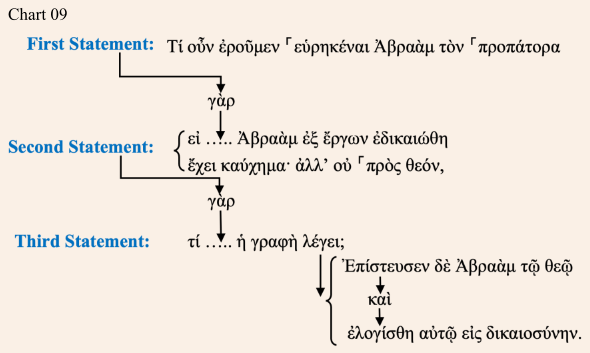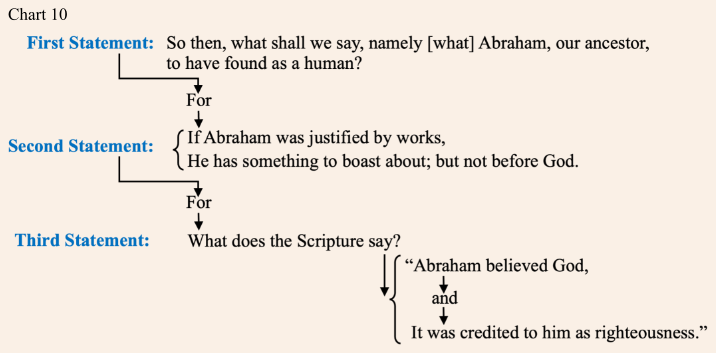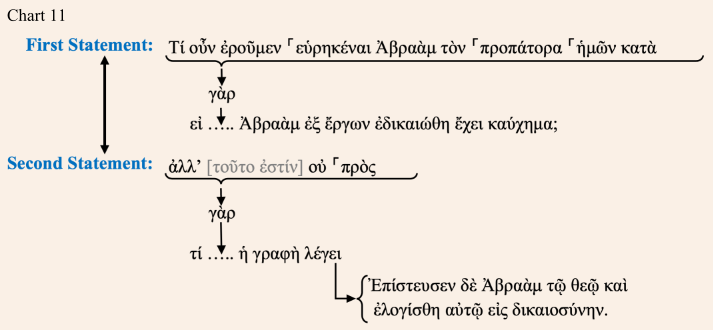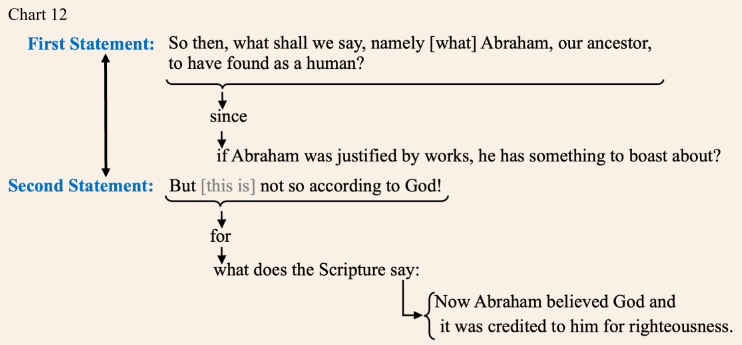Verses 4:1-8
Verse 4:1
Verses 4:1-8 begin a new section. The Apostle is now going back and discussing in in more detail the three topics he introduced in verses 3:27-31. This is the first topic which deals with the question of justification by works or Law. Actually, the issue is where is the place of boasting; can a person claim they did anything to achieve justification. (See verses 3:27-28.) Here in verses 4:1-8, Paul shows that in the case of Abraham and David, they could not boast because they were justified not by works but by faith.
Τί οὖν ἐροῦμεν ⸀εὑρηκέναι Ἀβραὰμ τὸν ⸀προπάτορα ⸀ἡμῶν κατὰ σάρκα;
So then, what shall we say, namely [what] Abraham, our ancestor, to have found as a human?
| τί | intr pro; nsa; τίς, τί; the accusative object of ἐροῦμεν. The phrase, ‘Τί οὖν ἐροῦμεν’ is used by Paul to introduce a new section. It is used in 4:1; 6:1; 7:7; 8:31; 9:14, 30. Here it introduces the first topic of discussion which was stated in chapter 3:27-28. This topic then is discussed by Paul in verses 4:1-8. |
| οὖν | conj; οὖν; inferential, denoting that what it introduces is the result of or an inference fr. what precedes so, therefore, consequently, accordingly, then; |
| ἐροῦμεν | verb; f, a, ind, 1p; λέγω; to say, speak; deliberative future; See note on τί above. |
| εὑρηκέναι | verb; pf, a inf; εὑρίσκω; to find; extensive (consummative) perfect; epexegetical infinitive explaining τί above (DW, p. 607); |
| Ἀβραὰμ | proper noun; msa; Ἀβραάμ; (accusative) subject of the infinitive εὑρηκέναι; |
| τὸν προπάτορα | art noun; msa; προπάτωρ; forefather, ancestor; in apposition to Ἀβραὰμ above; |
| ἡμῶν | 1st pers pers pro; gp; ἡμεῖς; we, us, our; genitive of relationship; |
| κατὰ | prep + acc; κατά; here it introduces something in reference to which something is true; |
| σάρκα | noun; σάρξ; flesh, body, By metonymy it refers to that which is human often with view of the fallen human nature. With κατά the idea is with reference to that which is human, humanly or as a human. |
Verse 4:2
εἰ γὰρ Ἀβραὰμ ἐξ ἔργων ἐδικαιώθη, ἔχει καύχημα· ἀλλʼ οὐ ⸀πρὸς θεόν,
since if Abraham was justified by works, he has something to boast about? But [this is] not so according to God!
| εἰ | cond ptcl; This introduces the protasis of a simple condition (first class). The protasis is εἰ γὰρ Ἀβραὰμ ἐξ ἔργων ἐδικαιώθη, the apodosis is ἔχει καύχημα·. |
| γὰρ | conj; γάρ; The four major uses of this conjunction are to express a cause, an inference, a continuation or an explanation (AG, p. 151). Question: What is the force of the γάρ here; that is, what is the connection of this conditional clause with the question posed by Paul in the previous verse? At this point I prefer the ideas of continuation or possible explanation. The first verse introduces the idea under discussion by repeating by use a a question the idea stated in verses 3:27-28. This verse explains that question or explains what the particular issue is in the following conditional statement. |
| Ἀβραὰμ | proper noun; msn; Ἀβραάμ; nominative subject of the verb ἐδικαιώθη; |
| ἐξ | prep + gen; ἐκ; of, out of; from, away from; Here it suggests the means or instrument, by, through, denoting the author or efficient cause. |
| ἔργων | noun; npg; ἔργον; work, deed, activity, task, job; object of the preposition ἐξ above. |
| ἐδικαιώθη, | verb; a, p, ind, 3s; δικαιόω; to justify, vindicate, declare righteous; constative aorist; |
| ἔχει | verb; p, a, ind, 3s; ἔχω; (tr.) to have, hold, keep; customary/general present; This word begins the apodosis. |
| καύχημα· | noun; nsa; καύχημα; something to boast about, boasting; pride, joy; accusative object of ἔχει above; This concludes the apodosis. |
| ἀλλʼ | conj; ἀλλά; but, instead, yet, except; Question: What is the significance of ἀλλά here? Is it connected just to the apodosis of the previous clause or to the whole conditional statement? It takes back or limits the entire preceding statement (AG, p. 37 under 2.). The “ἀλλά also serves to introduce a sentence with keenness and emphasis. (WMWeb, https://www.billmounce.com/greek-dictionary/alla)” |
| οὐ | neg adv; οὐ; no, not; While οὐ is normally seen as an adverb negating a predicate or verbal idea. While it can be used as a negative particle negating a noun or adjective (ATR, p. 1163), it seems best to see it negating a predicate here. The preceding ἀλλά limits the whole condition (apodosis and the protasis). See note on ἀλλά above. The negative adverb οὐ negates and understood subject and verb τοῦτο ἐστίν. |
| πρὸς | prep + acc; πρός; of the relation which any action, state, quality, etc., bears to any person or thing, in relation to, of, concerning, in respect to, with reference to, in accordance with (AG, p. 717 under III.5.d.). Question: What is the particular meaning here? I understand the idea of in accordance with. |
| θεόν, | noun; msa; θεός; God, god; accusative object of the preposition πρός; |
To understand what the Apostle is saying in verses 4:1-3, one must see the relationship between the clauses in these verses. How one chooses to punctuate them is very important here. Remember the original Greek text had no punctuation. It was a much later addition as were the verse divisions. Most modern English translations understand the four Greek words, ἀλλʼ οὐ ⸀πρὸς θεόν (but not concerning/in respect to/with reference to/in accordance with God) be making a contrast with just the words ἔχει καύχημα (he has something to boast about). It seems best to understand a full break between καύχημα and ἀλλʼ with the phrase ἀλλʼ οὐ ⸀πρὸς θεόν negating the entire conditional clause. Paul is not saying that if Abraham was justified by works it is not that he could boast but not just in God’s presence. He has already stated in verse 3:27 that it is excluded, not just before God, but before anybody. “So then, where [is] boasting? It is excluded. By what sort of principle? Of works? Not at all, but rather by the principle of faith!” What the Apostle is saying is that the whole reasoning is wrong. This is similar to reasoning by the contrapositive. If A is true, then B is true. But, B is not true, thus A is not true. If Abraham was justified by works, then he could indeed boast. But it is not true that Abraham could boast according to God because the Scriptures state this. Unstated conclusion is therefore Abraham was not justified by works! See diagrams following notes on text of verse 4:3.
Verse 4:3
τί γὰρ ἡ γραφὴ λέγει;
Ἐπίστευσεν δὲ Ἀβραὰμ τῷ θεῷ καὶ ἐλογίσθη αὐτῷ εἰς δικαιοσύνην.
For what does the Scripture say:
Now Abraham believed God and it was credited to him for righteousness.
| τί | intr pro; nsa; τίς; who?, what?, which?, why?; accusative object of the verb λέγει; |
| γὰρ | conj; γάρ; shows inference or continuation: for, because, indeed, but; Here it introduces the reason for Paul’s last statement, namely, assuming the idea that if justification is by works, then Abraham, humanly speaking, could have a boast, is not valid as far as God is concerned. |
| ἡ γραφὴ | art noun; fsn; γραφή; when singular normally a reference to a passage of the Scriptures; Here it is Genesis 15:6. |
| λέγει; | verb; p, a, ind, 3s; λέγω; to say, speak; instantaneous or progressive present; This is a common use of the figure of personification in reference to the Scripture. It is pictured as a person who is speaking. ‘What is the Scripture saying?’ or ‘What does the Scripture say?’ The following clause then is what the Scripture says. |
| ἐπίστευσεν | verb; a, a, ind, 3s; πιστεύω; to believe, put one's faith in, trust; constative aorist; |
| δὲ | conj ptcl; δέ; but, and, then, rather; indicates the addition of a clause, whether in opposition or in continuation, to what has preceded; |
| Ἀβραὰμ | proper noun; msn; ; Ἀβραάμ; Abraham; subject of Ἐπίστευσεν; |
| τῷ θεῷ | art noun; msd; θεός; God; dative object of ἐπίστευσεν; |
| καὶ | conj; καί; (as a connective) and; |
| ἐλογίσθη | verb; a, p, ind, 3s; λογίζομαι; to credit, count, reckon; regard, think, consider; constative aorist; understood subject is ὁ θεός; (AG, p. 477 states, “τινί τι εἴς τι credit someth, to someone as someth.”); Question: what is the subject of this verb? λογίζομαι is a middle deponent according to AG (AG, p. 476), but this is a passive form, not middle, thus, something was credited or reckoned. The αὐτῷ undoubtedly references Ἀβραάμ. What was credited then was Abraham’s faith, the fact that he believed God. |
| αὐτῷ | pers pro; 3rd msd; αὐτός; he, she, it; indirect object of ἐλογίσθη or perhaps dative of advantage; |
| εἰς | prep + acc; εἰς; to, toward, into; for; (Ag, p. 228, under 4.d. “w. the vocation, use, or end indicated for, as”); |
| δικαιοσύνην | noun; fsa; δικαιοσύνη; righteousness, what is right, justice; object of preposition εἰς; |
The next two charts show a diagramming (first Greek text then English) of verses 4:1-3 as how they are often understood.


The following charts (Greek then English) show a diagramming of how I believe one ought to understand the flow of thought in these verses.


Verse 4:4
τῷ δὲ ἐργαζομένῳ ὁ μισθὸς οὐ λογίζεται κατὰ χάριν ἀλλὰ κατὰ ὀφείλημα·
now to the one who works the reward is not reckoned by grace but by debt;
| τῷ | definite article; msd; ὁ; substantizes the participle ἐργαζομένῳ; |
| δὲ | conj ptcl; δέ; but, and, then, rather; indicates the addition of a clause, in continuation to what has preceded; |
| ἐργαζομένῳ | verb, p, mid, ptcp, msd; ἐργάζομαι; to work, be active, accomplish; adjectival participle, substantive; dative indirect object of the verb λογίζεται, or maybe dative of advantage; |
| ὁ μισθὸς | art noun, msn; μισθός; wage; reward; what is paid back; nominative subject of λογίζεται; The use of the article indicates a particular wage/reward, i.e. that which is related in particular to the work (See ATR, p. 757). |
| οὐ | neg adv; οὐ; no, not; |
| λογίζεται | verb; p, pass, ind, 3s; λογίζομαι; to credit, count, reckon; regard, think, consider; customary present; Although the form is middle or passive, the context indicates that it is passive here. |
| κατὰ | prep + acc; κατά; (acc.) in, by, with, in accordance with, for; |
| χάριν | noun; fsa; χάρις; grace, the state of kindness and favor toward someone; |
| ἀλλὰ | conj; ἀλλά; but, instead, yet, except; |
| κατὰ | prep + acc; κατά; (acc.) in, by, with, in accordance with, for; |
| ὀφείλημα | noun; nsa; ὀφείλημα; debt, obligation, what is owed; |
Verse 4:5
τῷ δὲ μὴ ἐργαζομένῳ, πιστεύοντι δὲ ἐπὶ τὸν δικαιοῦντα τὸν ἀσεβῆ, λογίζεται ἡ πίστις αὐτοῦ εἰς δικαιοσύνην,
but to the one who does not work but trusts the one who justifies the wicked his faith is credited as righteousness.
| τῷ | definite article; msd; ὁ; substantizes the participle μὴ ἐργαζομένῳ, πιστεύοντι δὲ; |
| δὲ | conj ptcl; δέ; but, and, then, rather; indicates the addition of a clause in opposition to what has preceded; |
| μὴ | neg adv; μή; no, not; negates the participle ἐργαζομένῳ; |
| ἐργαζομένῳ, | verb, p, deponent, ptcp, msd; ἐργάζομαι; to work, be active, accomplish; adjectival participle, substantive; dative indirect object of the verb λογίζεται, or maybe dative of advantage; |
| πιστεύοντι | verb; p, a, ptcp, msd; πιστεύω; to believe, put one's faith in, trust; adjectival participle, substantive; dative indirect object of the verb λογίζεται, or maybe dative of advantage; |
| δὲ | conj ptcl; δέ; but, and, then, rather; indicates the addition of a clause in opposition to what has preceded; |
| ἐπὶ | prep + acc; ἐπί; (acc.) across, over, on, to, for “in, on, for, toward of feelings, actions, etc. directed toward a pers, or thing: after words that express belief, trust, hope” (AG, p. 289 under II.1.b.ε.); |
| τὸν δικαιοῦντα | art ptcp, p, a, msa; δικαιόω; to justify, vindicate, declare righteous; adjectival participle, substantive; object of the preposition ἐπί; The article points out a particular person, here it is God for who else can justify the wicked except him? |
| τὸν ἀσεβῆ, | adj; msa; ἀσεβής; ungodly, wicked, impious; substantival use, object of the participle δικαιοῦντα; |
| λογίζεται | verb; p, pass, ind, 3s; λογίζομαι; to credit, count, reckon; regard, think, consider; customary present; Again this is a passive rather than a middle since the subject, ἡ πίστις αὐτοῦ, does not credit but is credited. |
| ἡ πίστις | noun; fsn; πίστις; faith, faithfulness, belief, trust; subject of λογίζεται above; |
| αὐτοῦ | pers pro; msg; αὐτός; he, she, it; subjective genitive of ἡ πίστις; |
| εἰς | prep + acc; εἰς; to, toward, into; for; (See verse 4:3.) |
| δικαιοσύνην, | noun; fsa; δικαιοσύνη; righteousness, what is right, justice; object of preposition εἰς; |
Verse 4:6
καθάπερ καὶ Δαυὶδ λέγει τὸν μακαρισμὸν τοῦ ἀνθρώπου ᾧ ὁ θεὸς λογίζεται δικαιοσύνην χωρὶς ἔργων
Just as David also speaks concerning the blessedness of the person to whom God credits righteousness apart from works:
| καθάπερ | conj/adv; καθάπερ; as, just as, like; |
| καὶ | conj; καί; (as an adv) also, even, likewise; |
| Δαυὶδ | proper noun; Δαυίδ; David; subject of λέγει below; |
| λέγει | verb; λέγω; to say, speak; instantaneous present; Paul is using the figure of personification in which David as if alive and present speaking aloud, represents the Scriptures, specifically Psalm 32:1-2. |
| τὸν μακαρισμὸν | art noun; msa; μακαρισμός; blessedness, joy; adverbial accusative of respect or reference; |
| τοῦ ἀνθρώπου | noun; msg; ἄνθρωπος; human being, person; humankind, people; man; possessive genitive of τὸν μακαρισμόν above; |
| ᾧ | rel pro; ὅς; who, which, what, that; antecedent is τοῦ ἀνθρώπου above; dative indirect object of λογίζεται below; |
| ὁ θεὸς | noun; msn; θεός; God; stated subject of λογίζεται below; |
| λογίζεται | verb; p, deponent mid, ind, 3s; λογίζομαι; to credit, count, reckon; regard, think, consider; gnomic present; |
| δικαιοσύνην | noun; fsa; δικαιοσύνη; righteousness, what is right, justice; accusative direct object of λογίζεται; |
| χωρὶς | prep + gen; χωρίς; improper preposition, apart, apart from; |
| ἔργων· | noun; npg; ἔργον; work, deed, activity, task, job; object of preposition χωρίς; |
Verse 4:7
Μακάριοι ὧν ἀφέθησαν αἱ ἀνομίαι καὶ ὧν ἐπεκαλύφθησαν αἱ ἁμαρτίαι,
Blessed [are they] whose lawless deeds are forgiven and whose sins are covered;
| μακάριοι | dj; mpn; μακάριος; blessed, fortunate, good, happy; This the predicate of a verbless equative clause; the subject of which is the two following relative clauses having an understood subject/verb, εἰσίν. |
| ὧν | rel pro; mpg; ὅς; who, which, what, that; the antecedent is the subject of the understood verb εἰσίν; a subjective genitive of αἱ ἀνομίαι; Robertson suggests, “In Ro. 4:7 ὧν has as its unexpressed antecedent οὗτοι.” (ATR, p. 720). |
| ἀφέθησαν | verb; a, p, ind, 3p; ἀφίημι; to forgive, pardon, remit, cancel; gnomic aorist; |
| αἱ ἀνομίαι | noun; fpn; ἀνομία; wickedness, lawlessness, lawless deed; nominative subject of ἀφέθησαν; |
| καὶ | conj; καί; and (as a connective); This joins two parallel relative clauses. |
| ὧν | rel pro; mpg; ὅς; who, which, what, that; the antecedent is the subject of the understood verb εἰσίν; a subjective genitive of αἱ ἁμαρτίαι; |
| ἐπεκαλύφθησαν | verb; a, p, ind 3p; ἐπικαλύπτω; (pass.) to be covered, cover over; gnomic aorist; |
| αἱ ἁμαρτίαι, | noun; fpn; ἁμαρτία; sin, wrongdoing; stated subject of ἐπεκαλύφθησαν; |
Verse 4:8
μακάριος ἀνὴρ ⸀οὗ οὐ μὴ λογίσηται κύριος ἁμαρτίαν.
Blessed is the man whose sin the Lord will not possibly charge [to him].
| μακάριος | adj; μακάριος; blessed, fortunate, good, happy; This the predicate of a verbless equative clause. |
| ἀνὴρ | noun; msn; ἀνήρ; man, male, husband, a human being, individual; the subject the verbless clause; |
| οὗ | rel pro; msg; ὅς; who, which, what, that; antecedent is ἀνήρ above; a subjective genitive of ἁμαρτίαι below; |
| οὐ | neg adv; ; οὐ; no, not; This negative with μή and the following aorist subjunctive is an emphatic negation. |
| μὴ | neg adv; μή; neg adv; no, not; used with οὐ above; |
| λογίσηται | verb; a, mid, sub, 3s; λογίζομαι; to credit, count, reckon; regard, think, consider; This is an emphatic negation subjunctive. “It is the strongest way to negate something in Greek.” (DW, p. 468); Thus the use of the future tense in English making this more emphatic. |
| κύριος | noun; msn; κύριος; Lord, master; subject of λογίσηται; |
| ἁμαρτίαν | noun; fsa; ἁμαρτία; sin, wrongdoing; accusative direct object of λογίσηται; |